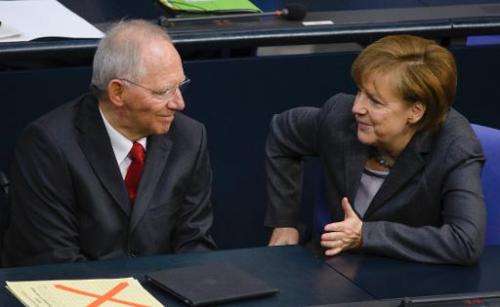German Finance Minister Wolfgang Schaeuble (L) speaks with German Chancellor Angela Merkel before presenting his draft budget for 2014 to lawmakers during a plenary session at the lower house of parliament Bundestag on April 8, 2014
The German government approved Tuesday a sweeping reform of a law on its vaunted green "energy transformation" to reduce subsidies for renewables and stem rising electricity prices.
Chancellor Angela Merkel's cabinet agreed the draft law for the next phase of the "Energiewende", a cornerstone policy of her third term at the helm of Europe's top economy.
Under the plan, Germany plans to meet 80 percent of its energy needs with renewables by 2050 but faces also having to balance the interests of its mighty industrial sector while safeguarding jobs.
The draft law, which must still pass the Bundestag lower house of parliament, will make the rollout of renewables "more predictable" and mean that costs "no longer increase by leaps and bounds", a government statement said.
Among the reforms are caps on the production of renewable energy such as offshore wind power.
"The coalition is providing for a reboot of the Energiewende. It was urgently and desperately needed," Economy and Energy Minister Sigmar Gabriel told reporters.
Merkel took the surprise decision in 2011 to gradually scrap nuclear power for renewables in the wake of the Fukushima disaster but has faced pressure over how to pay for the clean energy drive.
Activists of BUND and Campact ecological associations carry a giant head of German Chancellor Angela Merkel before a demonstration against the reform of the Renewable Energy Sources Act in front of the chancellery building in Berlin on April 8, 2014
Renewables currently account for around a quarter of energy production and consumption in Germany, thanks to generous state incentives for solar, wind and biogas financed via an energy tax.
But the tax has driven up energy prices, now among Europe's highest, and critics also say the development of some renewable energy sources has been disorganised and point to problems with the electricity transmission grid.
'Can't promise price reduction'
The new law, which is due to go into effect in August, aims to pull the brakes on electricity price rises but Gabriel warned "we cannot promise a reduction".
Germany has also increased consumption of cheaper fossil fuels such as coal to offset the phasing out of nuclear energy.
Gabriel, who is also Merkel's vice-chancellor, outlined dramatic cuts in subsidies to producers of renewable energy early in the year but pressure from regional states has forced the government to roll back on some points.
While states in northern Germany complained about cuts in wind power, southern Bavaria put up resistance to removing aid for biomass which could hurt farmers.
In the end, the caps on certain renewables remained in the reform but the subsidy reductions are milder than Gabriel initially wanted—biomass, for example, which Berlin had wanted to stop supporting in order to concentrate on wind and solar will continue to be subsidised.
Submitting the sector to market mechanisms is also a key factor of the reforms, and from 2017, the level of support will be defined by a tender system ensuring competition among producers.
Producers will gradually also have to sell their green energy competitively on the market rather than enjoying priority treatment with guaranteed prices.
Business groups have welcomed the move to a more competitively driven system even if it comes too late for some, but environmentalists accuse Gabriel of sounding the death knell on the green energy switch.
Friends of the Earth Germany urged parliament to "repair" the draft law which, it said, risked becoming an "instrument of industry subsidisation".
And Holger Krawinkel, head of the VZBV Federation of German Consumers Organisations, accused the government of having given preference to the interests of industry.
"And the consumers must pay," he said.
A key part, however, still missing from the reform concerns energy price breaks for power-intensive industry which the European Commission was probing to see if it amounted to state aid.
Gabriel has negotiated a compromise with Brussels to allow the price breaks to continue but to apply to fewer companies.
Decided too late to be included in the reform, it however was welcomed by German industry, with Utz Tillmann, head of the VCI chemical federation, calling it an "important political success" that would protect jobs.
© 2014 AFP
























